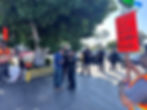Civil Rights Case Brewing After Police Break Up Union Demonstration at Honda World SoCal
- BDN
- Nov 13, 2024
- 2 min read

A recent demonstration at a car dealership in Southern California took an unexpected turn when law enforcement intervened and broke up the gathering, raising concerns about workers' rights and freedom of speech. The demonstration, organized by union members advocating for fair wages, ultimately resulted in the arrest of two Union members for alleged trespassing. This incident has sparked a potential civil rights case, as labor leaders argue that police officers and the city attorney misunderstood key state laws that protect peaceful union activities, including the right to distribute handbills and picket in front of a business with which there is a labor dispute.
According to attendees, the demonstration was peaceful until the owner of Honda World arrived followed by local police who then ordered the crowd to disperse. “First, the owner came out screaming at us, then law enforcement showed up claiming that we were causing a disruption. Two of the guys were then arrested for what they are calling trespassing,” said union member and attendee John Tafoya.
It’s Our Right!
Union leaders are now considering a civil rights lawsuit, arguing that law enforcement overstepped by arresting members engaged in protected activities under California law. “We were simply exercising our right to free speech and peaceful demonstration, yet we were met with unnecessary force and intimidation,” says Tafoya.

Union leaders are now considering a civil rights lawsuit, arguing that law enforcement overstepped by arresting members engaged in protected activities under California law. “We were simply exercising our right to free speech yet we were met with unnecessary force and intimidation,” says Tafoya.
The Moscone Act, along with the California Supreme Court decision in Ralphs Grocery Co. v. United Food & Commercial Workers Union Local 8 (2012), provides unions the right to engage in peaceful picketing and hand billing on private property without being deemed trespassers. This act underscores that peaceful union activities cannot be blocked simply due to the location if they are conducted lawfully.
Implications for the Future
This incident has raised broader questions about law enforcement’s understanding of lawful labor demonstrations and could highlight a need for additional training. The civil rights case could set a precedent and reinforce the protections afforded to workers and union members. One of the organizers, Carpenters regional manager Jacob Lopez emphasized, “This isn’t just about one demonstration—this is about the broader right to free speech, information dissemination, and peaceful assembly for all workers.”

Union members are calling for better education and awareness within law enforcement to ensure that the right to demonstrate is respected. As the civil rights case develops, labor advocates hope it will highlight the importance of protecting the right to inform the public in this way and the overall peaceful assembly rights for workers. "If they aren’t up to speed on our rights as American citizens to assemble and hand out information, they will be soon!” says Lopez.